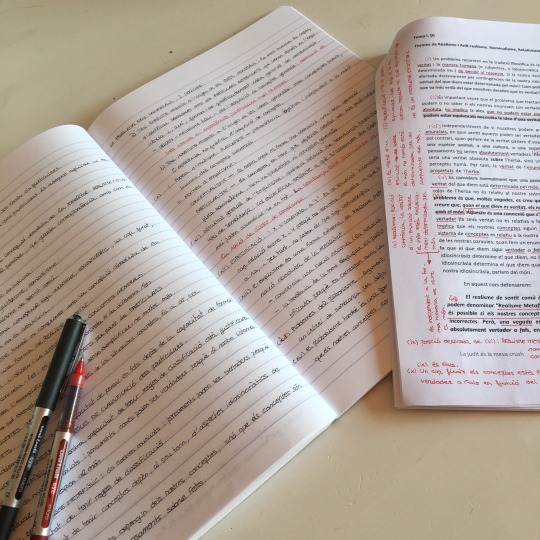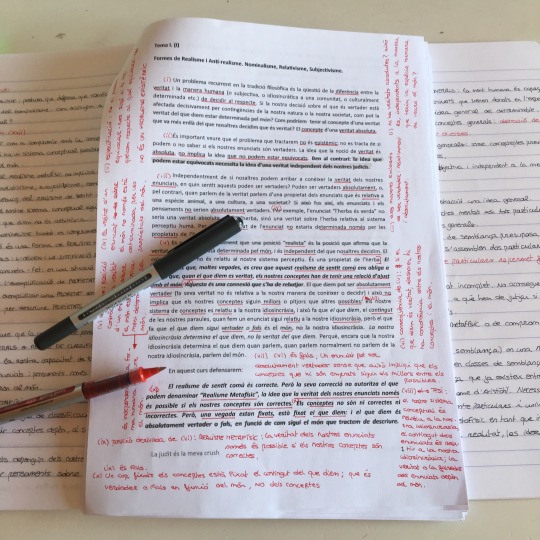Text
hey. don’t cry. crush four cloves of garlic into a pot with a dollop of olive oil and stir until golden then add one can of crushed tomatoes a bit of balsamic vinegar half a tablespoon of brown sugar and stir for a few minutes adding a handful of fresh spinach until wilted and mix in half a cup of grated parmesan cheese and pasta of your choice ok?
239K notes
·
View notes
Link
Just putting this here where I won’t lose it…
19K notes
·
View notes
Text
An abbreviated guide to the study of continental philosophy
Continental philosophy can be unfriendly to the newcomer. Before reading something it’s hard to have an idea of what you need to know beforehand and to what extent. Well, not anymore. I have single handedly cracked continental philosophy so you don’t have to waste your time.

———
Key
(F): Familiarity, a couple of surveys or monographs are enough.
(G): Good understanding, some specialized secondary sources plus some important selections of the primary sources are needed.
(E): Excellent understanding, a great deal of primary sources with the aid of studies and commentaries.
——-
General Background: some texts on the history of modern philosophy (1500 -1900 ca.)
To be chosen depending on your interests and level:
* A. W. Moore - The Evolution of Modern Metaphysics (easy)
* Benett - Learning from Six Philosophers
* Bowie - Schelling and Modern European Philosophy
* Dicker - Hume’s Metaphysics and Epistemology
* Baillie - Hume on Morality
* Bennett - Learning from Six Philosophers
* Bennett - Kant’s Analytic
* Bennett - Kant’s Dialectic
* Longuenesse - Kant and the Capacity to Judge
* Rachel - Elements of Moral Philosophy
* Beiser - Hegel
* Taylor - Hegel
* Houlgate - An Introduction to Hegel
* Pinkard - German Philosophy 1760-1860
* Beiser - German Idealism: The Struggle against Subjectivism, 1781–1801
* Wood - Fichte
* Sinclair - Bergson
* Safranski - Nietzsche
* Malpass (eds) - The History of Philosophical and Formal Logic
Classical Phenomenology
Previous requirements: History of modern philosophy (F), British empiricism (G), Kant (G), History of formal logic (F).
Focus: Husserl
Also: Scheler.
Suggested readings to begin:
*** Introductory / Context:
Bell - Husserl
Sokolowski - Introduction to Phenomenology
Zahavi - Phenomenology
Zahavi - Husserl’s Phenomenology
Spiegelberg - The Phenomenological movement (v1)
*** Primary:
Welton (ed) - The Essential Husserl
Husserl - Logical Investigations
Husserl - Ideas
Husserl - The Crisis of European Sciences and Transcendental Phenomenology
*** Secondary
Zahavi - Husserl’s Legacy
Derrida - Edmund Husserl’s “Origin of Geometry”
Derrida - Speech and Phenomena
Smith & Smith (eds) - The Cambridge Companion to Husserl
Ingarden - On the Motives which led Husserl to Transcendental Idealism
Late Phenomenology
Previous requirements: classical phenomenology (E), Hegel (F), ancient philosophy (F), christian/jewish theology (F).
Focus: Heidegger, Merleau-Ponty.
Also: Stein, Levinas, Arendt.
Suggested readings to begin:
*** Introductory / Context:
Gelven - Heidegger’s Being and Time
Moran - Introduction to Phenomenology
Spiegelberg - The Phenomenological movement (v2)
Carman - Merleau Ponty.
*** Primary:
Heidegger - Being and Time,
Krell (ed) - Heidegger: Basic Writings,
Moran & Mooney (eds) - The Phenomenology Reader,
Baldwin (ed) - Maurice Merleau-Ponty: Basic Writings
*** Secondary:
Lafont - Heidegger, Language, and World-Disclosure,
Mitchell - The Fourfold: Reading the Late Heidegger,
Derrida - Heidegger: The Question of Being and History
Gadamer - Heidegger’s Ways
Guignon - Heidegger and the Problem of Knowledge
Calle-Gruber (ed) - Heidegger, Philosophy, and Politics: The Heidelberg Conference
Lacoue-Labarthes - Heidegger, art, and politics
Kyoto School
Previous requirements: Kant (G), Hegel (G), late phenomenology (G), zen buddhist philosophy (E).
Focus: Nishida
Also: Nishitani, Tanabe.
Suggested readings to begin:
*** Introductory / Context:
Heisig - Philosophers of Nothingness,
Yusa - Zen and Philosophy: An Intellectual Biography of Nishida Kitarō
Kasulis - Engaging Japanese Philosophy: A Short History,
Wright - Philosophical Meditations on Zen Buddhism
Carter - Nothingness Beyond God:
*** Primary:
Franck & Staumbaugh (eds) - The Buddha Eye: An Anthology of the Kyoto School and Its Contemporaries,
Nishida - An Inquiry into the Good.
*** Secondary
Nishitani - Nishida Kitarō
Wargo - The Logic of Nothingness
Existentialism
Previous requirements: late phenomenology (F), Kierkegaard (F), feeling angst (E).
Focus: Sartre
Also: Camus, Beauvoir.
Suggested readings to begin:
*** Introductory / Context:
Solomon - From Rationalism to Existentialism,
Hannay - Kierkegaard,
Sartre - Existentialism Is a Humanism.
*** Primary:
Marino - Basic Writings of Existentialism,
Sartre - Being and Nothingness.
*** Secondary:
Solomon - Dark Feelings, Grim Thoughts
Crowell - The Cambridge Companion to Existentialism,
Taylor - The Ethics of Authenticity.
Flynn - Sartre: A Philosophical Biography
Stewart (ed) - The Debate Between Sartre and Merleau-Ponty
Phenomenological Hermeneutics
[under construction]
Previous requirements: late phenomenology (G), ancient philosophy (G)
Focus: Gadamer, Ricoeur.
Also: Jauss, Vattimo.
Suggested readings to begin:
Western Marxism/ Structural Marxism /Frankfurt School
Previous requirements: classical sociology (F), psychoanalysis (F), Kant (G), Hegel (G), Aesthetics (F), Marx’s sociology/philosophy (E), Marx’s economic thought (F).
Focus:, Adorno, Althusser.
Also: Lukács, Kosch, Benjamin, Horkheimer, Marcuse, Habermas (early), Offe.
Suggested readings to begin:
*** Introductory / Context:
Wood - Karl Marx,
Kojeve - Introduction to the Reading of Hegel
Gordon - Philosophy of the Arts,
Lear - Freud
O’Connor - Adorno
Held - Introduction to Critical Theory,
Ferris - The Cambridge Introduction to Walter Benjamin.
Ferreter - Louis Althusser
*** Primary:
Lukacs - History and Class Consciousness
Korsch - Marxism and Philosophy
Adorno & Horkheimer - Dialectic of Enlightenment,
Horkheimer - Critical Theory
Adorno - Aesthetic Theory
Adorno - Negative Dialectics,
Horkheimer - Eclipse of Reason
Habermas - Science and Technology as Ideology
Jameson (ed) - Aesthetics and Politics.
Althusser & Balibar (eds) - Reading Capital
Althusser - Ideological States Apparatuses
*** Secondary:
Honneth - Pathologies of Reason: On the Legacy of Critical Theory,
Lunn - Marxism and Modernism,
Kolakowski - Main Currents of Marxism
Castoriadis - On the Content of Socialism
Post-structuralism
Previous requirements: late modern philosophy (G), structuralism (F), late phenomenology (G), Freud (G), Lacan (F/G), Western Marxism (F), ancient philosophy (F/G).
Focus: Foucault, Derrida, Deleuze.
Also: Kristeva, Barthes, Butler, Nancy, Cixous, Irigaray.
Suggested readings to begin:
*** Introductory / Context:
Chandler - Semiotics: The Basics,
Badcock - Structuralism and Social Theory
Hawkes - Structuralism and Semiotics
Homer - Lacan
Jameson - The Prison-House of Language
Colebrook - Gilles Deleuze
Norris - Deconstruction
Mills - Michel Foucault
Shields - Ancient Philosophy
Hadot - What is Ancient Philosophy?
*** Primary:
Deleuze & Guattari -Capitalism and Schizophrenia,
Deleuze & Guattari - What is Philosophy?
Deleuze - Difference and Repetition.
Foucault - The Order of Things,
Foucault - The Archeology of Knowledge,
Foucault - Power/Knowledge
Derrida - Of Grammatology,
Derrida - Writing and Difference
Derrida - Speech and Phenomena,
Derrida - Margins of Philosophy,
*** Secondary:
Dreyfus & Rabinow - Michel Foucault
Fraser - Unruly Practices
Norris - Against Relativism
Holland - Deleuze and Guattari’s Anti-Oedipus
Patton (ed) - Deleuze: A Critical Reader
Habermas - The Philosophical Discourse of Modernity
Contemporary Post-Marxism / Non-Marxism
[under construction]
Previous requirements: post-structuralism (G), western marxism (F), late phenomenology (F), Hegel (G), Marx’s sociology/philosophy (G), Lacan (G).
Focus: Badiou, Mouffe & Laclau, Agamben, Ranciere, Laurelle.
Also: Zizek
Laclau & Moouffe - Hegemony and Socialist Strategy
New / Speculative Realism
[under construction]
Previous requirements: classical phenomenology (F), philosophy of science (F), late phenomenology (G), post-structuralism (F), Deleuze (G), modern philosophy (F), German Idealism (G), Actor-Network-Theory (F), contemporary post-marxism (F), analytic metaphysics (F).
Focus: Meillasoux, Harman, Ferraris, Gabriel.
Also: DeLanda, Shaviro, Brassier, Grant, Thacker.
Suggested readings to begin:
*** Introductory / Context: :
- Ferraris - Introduction to New Realism
- Sparrow - The End of Phenomenology: Metaphysics and the New Realism
- Harman - Speculative Realism
- Gabriel -Why the World Does Not Exist
- Latour - Reassembling the Social: An Introduction to Actor-Network-Theory
*** Primary:
Brassier -Nihil Unbound
Ferraris - Manifesto of New Realism
Harman - Object-Oriented Ontology: A New Theory of Everything
Harman - The Quadruple Object
Gabriel - Fields of Sense: A New Realist Ontology
Grant - Philosophies of Nature after Schelling
Meillasoux - After Finitude
*** Secondary:
Bryant, Harman (eds) - The Speculative Turn
DeLanda & Harman - The Rise of Realism
Shaviro - The Universe of Things: On Speculative Realism
Harman - Quentin Meillassoux: Philosophy in the Making
681 notes
·
View notes
Photo

I believe in free education, one that’s available to everyone; no matter their race, gender, age, wealth, etc… This masterpost was created for every knowledge hungry individual out there. I hope it will serve you well. Enjoy!
FREE ONLINE COURSES (here are listed websites that provide huge variety of courses)
Alison
Coursera
FutureLearn
open2study
Khan Academy
edX
P2P U
Academic Earth
iversity
Stanford Online
MIT Open Courseware
Open Yale Courses
BBC Learning
OpenLearn
Carnegie Mellon University OLI
University of Reddit
Saylor
IDEAS, INSPIRATION & NEWS (websites which deliver educational content meant to entertain you and stimulate your brain)
TED
FORA
Big Think
99u
BBC Future
Seriously Amazing
How Stuff Works
Discovery News
National Geographic
Science News
Popular Science
IFLScience
YouTube Edu
NewScientist
DIY & HOW-TO’S (Don’t know how to do that? Want to learn how to do it yourself? Here are some great websites.)
wikiHow
Wonder How To
instructables
eHow
Howcast
MAKE
Do it yourself
FREE TEXTBOOKS & E-BOOKS
OpenStax CNX
Open Textbooks
Bookboon
Textbook Revolution
E-books Directory
FullBooks
Books Should Be Free
Classic Reader
Read Print
Project Gutenberg
AudioBooks For Free
LibriVox
Poem Hunter
Bartleby
MIT Classics
Many Books
Open Textbooks BCcampus
Open Textbook Library
WikiBooks
SCIENTIFIC ARTICLES & JOURNALS
Directory of Open Access Journals
Scitable
PLOS
Wiley Open Access
Springer Open
Oxford Open
Elsevier Open Access
ArXiv
Open Access Library
LEARN:
1. LANGUAGES
Duolingo
BBC Languages
Learn A Language
101languages
Memrise
Livemocha
Foreign Services Institute
My Languages
Surface Languages
Lingualia
OmniGlot
OpenCulture’s Language links
2. COMPUTER SCIENCE & PROGRAMMING
Codecademy
Programmr
GA Dash
CodeHS
w3schools
Code Avengers
Codelearn
The Code Player
Code School
Code.org
Programming Motherf*?$%#
Bento
Bucky’s room
WiBit
Learn Code the Hard Way
Mozilla Developer Network
Microsoft Virtual Academy
3. YOGA & MEDITATION
Learning Yoga
Learn Meditation
Yome
Free Meditation
Online Meditation
Do Yoga With Me
Yoga Learning Center
4. PHOTOGRAPHY & FILMMAKING
Exposure Guide
The Bastards Book of Photography
Cambridge in Color
Best Photo Lessons
Photography Course
Production Now
nyvs
Learn About Film
Film School Online
5. DRAWING & PAINTING
Enliighten
Ctrl+Paint
ArtGraphica
Google Cultural Institute
Drawspace
DragoArt
WetCanvas
6. INSTRUMENTS & MUSIC THEORY
Music Theory
Teoria
Music Theory Videos
Furmanczyk Academy of Music
Dave Conservatoire
Petrucci Music Library
Justin Guitar
Guitar Lessons
Piano Lessons
Zebra Keys
Play Bass Now
7. OTHER UNCATEGORIZED SKILLS
Investopedia
The Chess Website
Chesscademy
Chess.com
Spreeder
ReadSpeeder
First Aid for Free
First Aid Web
NHS Choices
Wolfram Demonstrations Project
Please feel free to add more learning focused websites.
*There are a lot more learning websites out there, but I picked the ones that are, as far as I’m aware, completely free and in my opinion the best/ most useful.
532K notes
·
View notes
Text
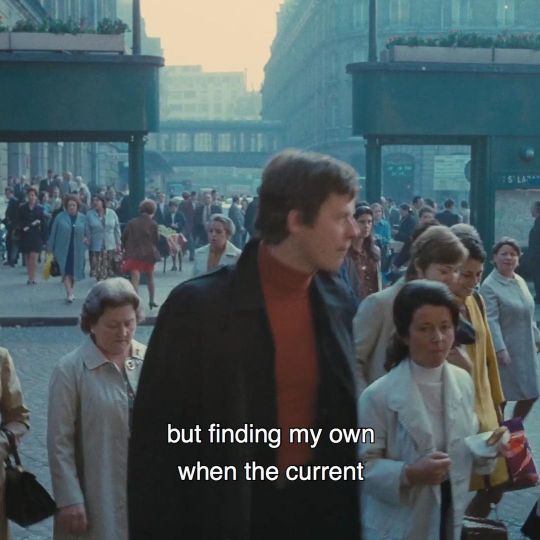

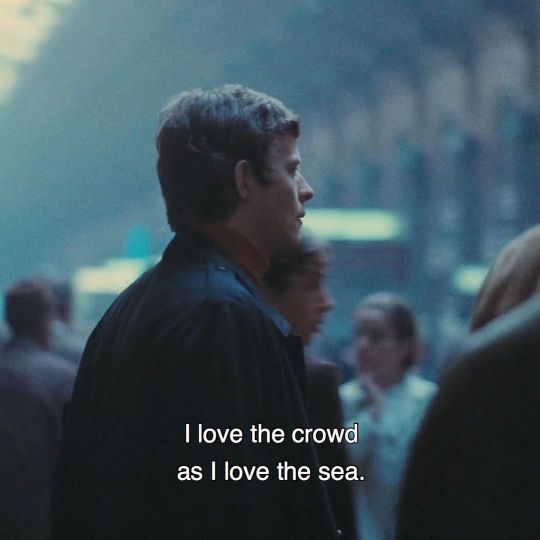
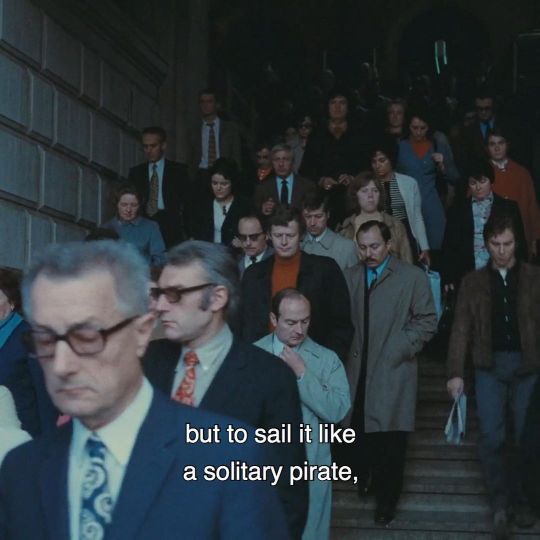

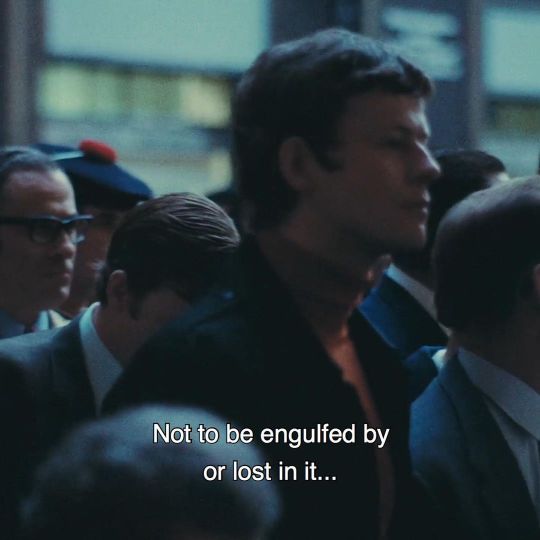
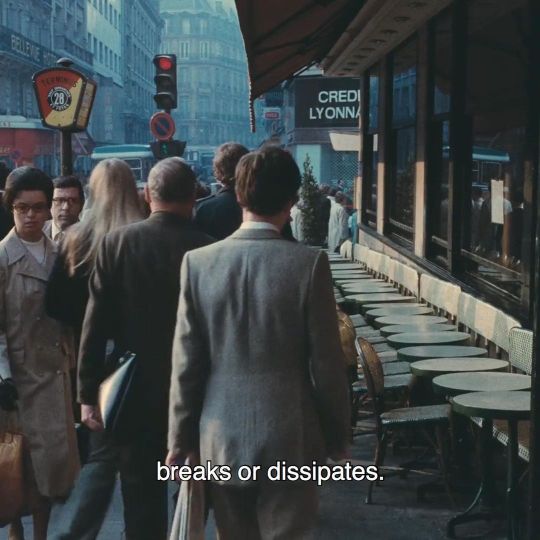

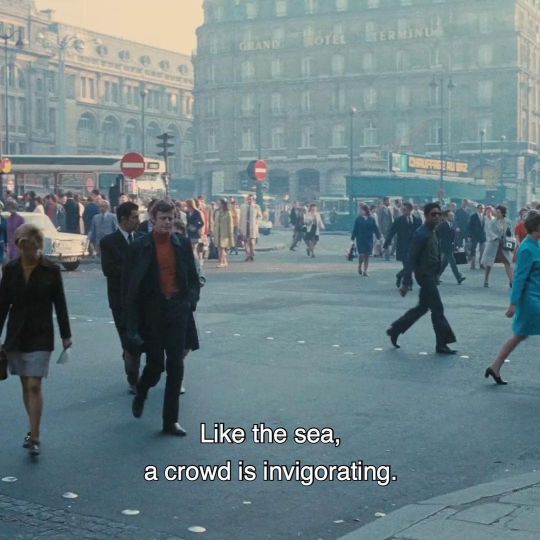
L'Amour l'après-midi / Love in the Afternoon (1972)
dir. Éric Rohmer
2K notes
·
View notes
Text


29.04.2021 // chaos
My semester is ending and it’s quite out of control. Studying for finals in two different universities is harder then I thought, so here are photos of some moments of peace.
244 notes
·
View notes
Text
repeat after me 💫✨
🧿 i release all attachments to outcomes
🧿 whatever is meant to be, will be
🧿 i trust in divine timing
🧿 timing is in my favor
8K notes
·
View notes
Text

hello everyone! i thought i would share some keyboard shortcuts in notion that i use the most often and that save me the most time.
note: most actions from word processors, like ctrl + b for bold, will already work in notion!
#, ##, or ### + space to create large, medium, and small headings respectively
> + space to create a toggle block
/, the forward slash, lets you create any page you want. just type out what you’re looking for (i.e. page, table, link)
ctrl + \ toggles the sidebar on and off
ctrl + shift + n opens a new notion window (i use this for notetaking)
ctrl + shift + u lets you go up a level in the page hierarchy (i.e. from february to all months)
duplicate any content by holding option or alt and dragging. you can highlight as many blocks as you want
ctrl + / to change the type of blocks you have selected
ctrl + shift + p to move the page you’re on to another one (i like to use this for my article list to move them to my already read list
hope this helps :)
4K notes
·
View notes
Photo
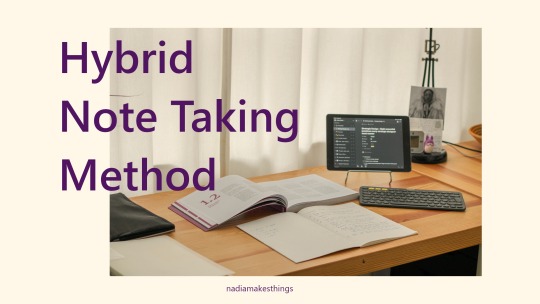
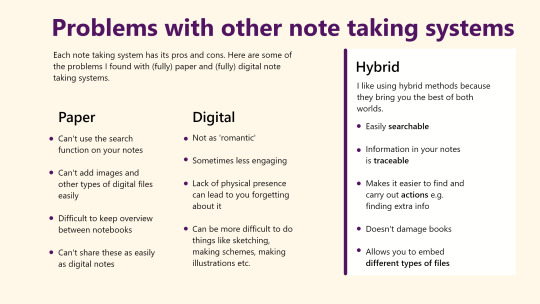
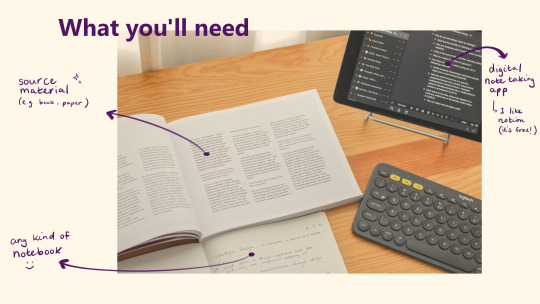
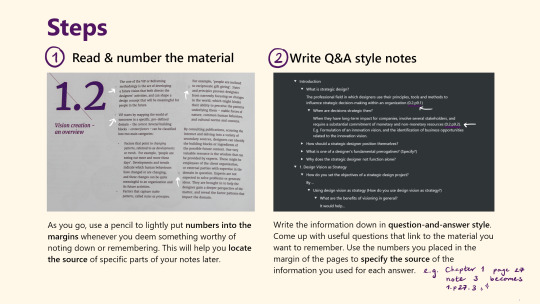
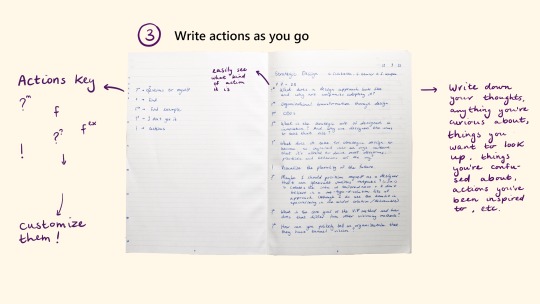
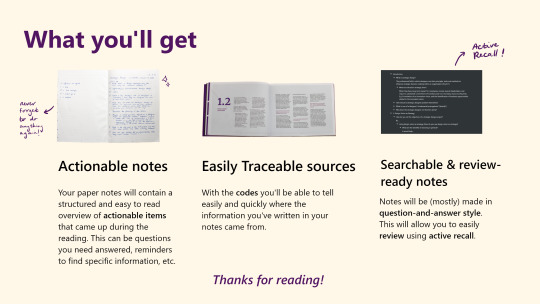
Hybrid Note Taking Style
A note taking method that blends the best of paper and digital note taking that I’ve been exploring lately. So far it’s working really well for me :) Hope it helps!
Hybrid Note Taking Method
Problems with other note taking systems
Each note taking system has its pros and cons. Here are some of the problems I found with (fully) paper and (fully) digital note taking systems.
Paper
Can’t use the search function on your notes.
Can’t add images and other types of digital files easily.
Difficult to keep overview between notebooks.
Can’t share these as easily as digital notes.
Digital
Not as ‘romantic’.
Sometimes less engaging.
Lack of physical presence can lead to you forgetting about it.
Can be more difficult to do things like sketching, making schemes, making illustrations etc.
Benefits of Hybrid
I like using hybrid methods because they bring you the best of both worlds.
Easily searchable.
Information in your notes is traceable.
Makes it easier to find and carry out actions e.g. finding extra info.
Doesn’t damage books.
Allows you to embed different types of files.
What you’ll need
Source material (e.g. book, academic paper)
Any kind of notebook :)
Digital note-taking app → I like Notion (it’s free).
Step 1 - Read & number the material
As you go, use a pencil to lightly put numbers into the margins whenever you deem something worthy of noting down or remembering. This will help you locate the source of specific parts of your notes later.
Step 2 - Write Q&A-style notes
Write the information down in question-and-answer style. Come up with useful questions that link to the material you want to remember (e.g. Q → What is the main problem with using platform-based planning for new ventures? A → Assumptions underlying the plan are used as fact rather than best-guess estimates to be tested and questioned). Use the numbers you placed in the margin of the pages to specify the source of the information you used for each answer.
Example → Chapter 1 page 27 note 3 becomes 1.p27.3
Step 3 - Write actions as you go (Supporting notes)
Supporting notes
Write down your thoughts, anything you’re curious about, things you want to look up, things you’re confused about, actions you’ve been inspired to do, etc. For example → ?m Maybe I can apply this to my visualization assignment? / ! Look up what 'plurality of the future’ is / fex Organizational transformation through design. I find this a great way to support and manage the learning process.
Action key
Keep a small action key in which you have an overview of what your action marks mean (e.g. ?m→ questions to myself, f → find, fex → find example, ?? → I don’t get it, ! → general actions)
Don’t be afraid to customize your actions!
What you’ll get
Actionable notes
Your paper notes will contain a structured and easy to read overview of actionable items that came up during the reading. This can be questions you need answered, reminders to find specific information, etc. This will make them a lot harder to forget to do!
Easily traceable sources
With the codes you’ll be able to tell easily and quickly where the information you’ve written in your notes came from.
Searchable & review-ready notes
Notes will be (mostly) made in question-and-answer style. This will allow you to easily review using active recall. All you need to do is cover/hide the answer and you can check how well you truly know the material.
Thanks for reading!
5K notes
·
View notes
Text
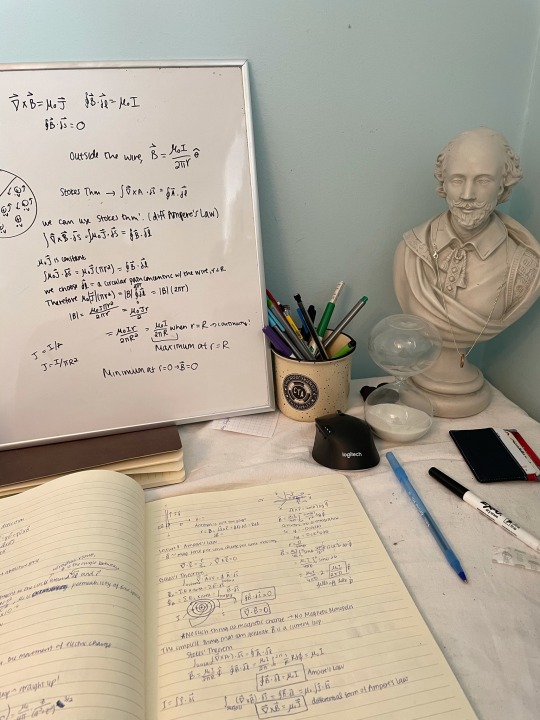


03.09.21
{magnetism and matrices}
1. it feels like spring; 2. i cut my hair very short and i am very happy; 3. i love magnetism because i get to write mu so much and it is my favorite
p.s. billy shakes makes his second appearance of the week
251 notes
·
View notes
Text
Train Yourself to Stay Focused During Online Class
I tend to beat myself up a lot for not being disciplined enough to carry out the dark academia lifestyle. It’s difficult to remember that everyone’s struggling with paying attention. So, I compiled a few things that have helped me developed some habits for lengthening my attention span during class!
1. Don’t immediately reach for your phone when bored.
Generally the first step to training yourself out of this habit is to practice it outside of class. If you have access to them, video games are a great way to relieve boredom. It isn’t instant gratification in the same way social media is, and, depending on the game, requires focus. It isn’t inherently academic and won’t take up too much brainpower, which is perfect for curing boredom and getting yourself away from the instant gratification mindset.
2. When watching a show/movie, don’t get sidetracked or do other things.
I have found myself watching one of my favorite shows (criminal minds) and not being able to go without checking my phone throughout the entire 40 minute period. Pour your focus and energy into whichever show or movie you’re watching. For example, with criminal minds, try and form a profile with them, or construct your own theories. If you really need to take a break from watching, pause the show, and give yourself a 5 minute limit. Finishing what you start is a huge part of this.
3. If you’re in college, attend zoom lectures and not just pre-recorded ones.
This helps hold you accountable for paying attention in class. If comfortable, turn your camera on– not only for yourself, but also to help your professor feel more comfortable teaching. Being there in real time makes you more likely to ask questions and take detailed notes. If possible, treat the pre-recorded lectures as more of a textbook or resource than an actual class.
4. Find something to do with your hands.
Not only is your phone something to look at, it’s something to do. Find something else to replace it with. It could be something designated for fidgeting (fidget cube or spinner), or it could just be mindless doodling on paper. I formed a ring out of polymer clay that I spin between my index finger and thumb.
5. Start simple.
Don’t just immediately decide that you’re never going to use social media ever again. Set a simple goal for yourself, like spending an hour a day separated from your phone and electronics. For this, I like to use the app Bakery on my phone. It allows you to set a timer for a baked good, and if you leave the app for more than 10 seconds, the baked good burns. Of course, this isn’t going to wholly prevent you from using your phone during the allotted time, but for me, it served as a good reminder of what im striving towards.
I hope this helps at least a little! These are just a few of my findings and things that i do daily to kind of stomp on bad habits.
128 notes
·
View notes
Text
Intercessory prayer for Palm Sunday / Holy Week
Dear siblings in Jesus Christ,
As ever, we have so much to pray for…
But this week, I invite you to do something a little odd with me:
Will you pray with me for Jesus, too?
In this week in which we remember
his most agonizing moments,
his trauma, his desolation, his execution as a common criminal,
let’s pray for him, as he prays and works unceasingly for us.
Friends, let us pray.
…
For those unjustly blamed
across time and space:
for Jesus, accused and sentenced to death
by the powers who feared his revolutionary Kin(g)dom;
for our Jewish neighbors,
wrongly punished across the centuries for Christ’s death
and for many other crimes of which they are innocent;
for members of the Asian American and Pacific Islander community
who have become a hyper-visible target to pin this pandemic on;
for migrants and immigrants who are accused of
stealing jobs and depleting resources
simply for daring to seek a life for themselves and their loved ones;
we pray.
…
For those unjustly shamed
across time and space:
For Jesus, tortured and taunted by Roman soldiers,
stripped of his friends, his clothing, his life;
For sex workers
whose livelihoods are criminalized
and bodies dehumanized;
For all who have been victim-blamed,
told that harassment, abuse, and even death
are their fault because of who they are, how they act,
or the jobs or beliefs they hold;
we pray.
…
And for those who go unnamed
across time and space:
for the two men crucified alongside Jesus,
and the countless others who have been
tortured, executed, disappeared
from before the dawn of the Roman Empire
through the current regime the United States;
for all victims of mass shootings,
too many to name, too many to bear;
for the numberless masses of human beings crushed
under the grindstone of “progress,”
the deaths of their cultures and of their bodies justified
in the name of excess wealth for the few;
we pray.
…
O God who hears the cries
of those unjustly blamed,
those dehumanized and shamed,
those whose names are eradicated from recorded history –
and who replies
by becoming one of them,
by entering into ultimate solidarity on a Roman cross,
and by exposing the violence of worldly powers for the evil it is,
Thank you.
Make your Spirit known to us.
Unite and empower us for the work ahead.
Thank you.
Amen.
616 notes
·
View notes
Photo






Hybrid Note Taking Style
A note taking method that blends the best of paper and digital note taking that I’ve been exploring lately. So far it’s working really well for me :) Hope it helps!
5K notes
·
View notes

